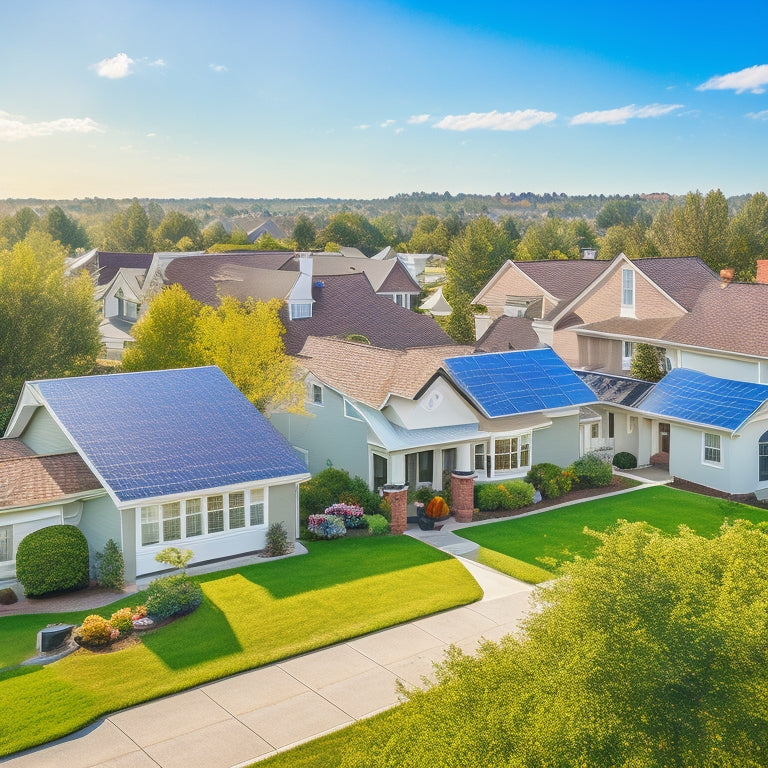
What Does Residential Solar Panel Installation Cost?
Share
You're looking to Install residential solar panels, but you're wondering what it'll set you back. On average, you can expect to pay between $15,000 and $30,000 for a standard system, with the national average hovering around $20,000. This cost includes not only the panels themselves but also installation labor, permits, and hardware expenses. However, incentives and rebate programs can help reduce the upfront cost. To get a better sense of how these factors impact your total cost, it's worth exploring each component in more detail - and understanding how they add up to your final bill.
Key Takeaways
• The average cost of a residential solar panel system is around $20,000, ranging from $15,000 to $30,000.
• System size, local labor costs, roof complexity, and equipment expenses are key factors affecting the total installation cost.
• Solar panels alone cost between $2.50 and $3.50 per watt, with labor costs varying based on complexity and local regulations.
• The total installation cost includes equipment and hardware expenses, permits, and inspection fees, as well as incentives and rebate programs.
• Residential solar panels can save $400 to $1,000 annually on electricity bills and offset up to 3 tons of carbon dioxide emissions annually.
Average Cost of Solar Panels
On average, you can expect to pay between $15,000 and $30,000 for a standard residential solar panel system, with the national average hovering around $20,000. This upfront investment may seem steep, but it's crucial to ponder the long-term benefits that come with harnessing renewable energy.
Solar panels can greatly reduce your reliance on the grid, leading to substantial energy savings over time. In fact, you can anticipate saving between $400 and $1,000 annually on your electricity bills, depending on your energy consumption and local rates.
Beyond the financial perks, solar panels also offer significant environmental benefits. By generating clean energy, you'll diminish your carbon footprint and contribute to a more sustainable future. Residential solar panels can offset up to 3 tons of carbon dioxide emissions annually, which is equivalent to planting over 1,000 trees.
As you weigh the costs and benefits of solar panel installation, remember that you're not just investing in a system – you're investing in a cleaner, more energy-independent future.
Factors Affecting Installation Cost
When contemplating the installation of solar panels, you'll want to comprehend the factors that influence the overall cost.
Two key aspects to take into account are:
- The system size and type, which affect the number of panels and equipment needed.
- Local labor costs, which vary by region and installer.
System Size and Type
Your residential solar panel installation cost is largely determined by the system size and type you choose, which directly impact the number of panels, inverters, and other equipment needed for the installation.
The system size, measured in watts (W), affects the number of panels required to meet your energy needs. A larger system size means more panels, increasing the overall cost.
Additionally, the type of system you choose, such as a grid-tied or off-grid system, also impacts the cost. Grid-tied systems are more common and cost-effective, while off-grid systems require more equipment, like batteries, increasing the cost.
When designing your system, energy efficiency is important. A well-designed system ensures maximum energy production, reducing the number of panels needed, and ultimately, the cost. A professional installer will assess your energy needs and design a system that meets those needs, taking into account factors like roof size, orientation, and shading.
Local Labor Costs
Labor costs, which vary greatly depending on the location, greatly impact your residential solar panel installation cost, with local installers' rates influencing the overall expense. As you consider different installation companies, you'll notice that labor costs differ considerably from one region to another. These variations are largely due to differences in local regulations, permitting requirements, and the cost of living in a particular area.
For instance, installers in urban areas tend to charge more than those in rural areas. Additionally, local regulations can drive up labor costs if they require specialized training or certifications, which increase the installer's overhead. Worker Safety protocols, such as OSHA compliance, also factor into labor costs. You may find that installers who prioritize worker safety charge more than those who don't.
When evaluating installation quotes, be sure to ask about the labor costs and what they entail, as this will help you make an informed decision. By understanding the local labor costs, you'll be better equipped to budget for your residential solar panel installation.
Cost of Solar Panels Alone
You'll pay between $2.50 and $3.50 per watt for solar panels alone, depending on the panel quality, brand, and quantity needed for your residential installation. The cost of solar panels can vary considerably based on the panel's energy efficiency and quality. High-efficiency panels with higher wattage output will generally cost more than standard panels.
Here are some factors that affect the cost of solar panels alone:
-
Panel Quality: High-quality panels with higher energy efficiency (20% or higher) will cost more than standard panels (15-18% efficiency).
-
Brand: Premium brands like Tesla, Panasonic, or SunPower may charge more than budget-friendly options like Trina or Jinko.
-
Quantity: The more panels you need for your installation, the higher the overall cost.
Keep in mind that while high-quality panels may cost more upfront, they can provide better energy efficiency and longer warranties, leading to long-term savings.
Installation Labor Costs Breakdown
When calculating the total cost of your residential solar panel installation, it's crucial to take into account the labor costs involved.
You'll need to factor in the per hour labor rate of the installation team, which can vary depending on the complexity of the job and the location.
Understanding how these labor expenses add up will give you a clearer picture of the overall installation cost.
Per Hour Labor Rate
Calculating the per hour labor rate for solar panel installation involves breaking down the total installation cost into its constituent parts, allowing homeowners to better understand the costs associated with the installation process. This breakdown helps you, as a homeowner, to identify the specific components that contribute to the overall cost.
When evaluating the per hour labor rate, consider the following factors that influence the cost:
-
Electrician certification: A certified electrician with specialized training in solar panel installation will typically command a higher hourly rate than a non-certified technician.
-
Union membership: Unionized laborers often have higher hourly rates due to the benefits and protections afforded by their union membership.
-
Regional labor rates: Labor rates vary by region, with urban areas typically having higher rates than rural areas.
Understanding these factors helps you make informed decisions about your solar panel installation project. By breaking down the total installation cost into its constituent parts, you'll be better equipped to negotiate with installers and ensure a successful project.
Total Labor Expenses
Your total labor expenses for solar panel installation are comprised of various components, including the installer's hourly rate, labor hours required for the job, and any additional costs associated with permits, inspections, and potential revisions.
As you consider the total labor expenses, you'll need to take into account the complexity of the installation, which can impact the number of labor hours required. For instance, a simple roof installation might require fewer labor hours compared to a more intricate installation involving multiple roof angles or complex electrical connections.
When evaluating labor expenses, you should also consider the workforce dynamics at play. Labor unions, for example, may impact the cost of labor, as unionized workers typically command higher wages. Additionally, local labor laws and regulations can influence labor costs, so it's vital to research these factors in your area.
Roof Size and Complexity Impact
The size and complexity of your roof greatly influence the cost of residential solar panel installation. Installers must adapt to unique roof shapes, sizes, and features. You may have a roof with multiple levels, skylights, or architectural features that require custom installation solutions. This complexity can increase labor costs and time, driving up the overall installation expense.
Some roof features that can impact installation costs include:
-
Roof obstructions: vents, chimneys, or skylights that require installers to work around or integrate with the solar panel system
-
Architectural styles: complex or non-standard roof designs, such as those found in modern or historic homes, that require specialized installation techniques
-
Multi-level or irregularly-shaped roofs: roofs with multiple levels, angles, or curves that demand more time and materials to install the solar panel system correctly
As you consider residential solar panel installation, be aware that your roof's unique characteristics will influence the final cost. Be sure to discuss these factors with your installer to get an accurate estimate for your project.
Equipment and Hardware Expenses
When you take into account the unique demands of your roof, you'll also need to contemplate the equipment and hardware required to bring your solar panel system online. This includes the cost of high-efficiency panels, inverters, and mounting hardware. These components are vital to your system's performance and overall efficiency.
High-efficiency panels can greatly boost your energy output, but they come at a higher cost. Inverters, which convert DC power to AC, are another essential component. You may want to think about inverter upgrades to guarantee maximum energy harvesting.
Additionally, mounting hardware, such as racking and tracking systems, will add to your overall expenses. Don't forget to factor in battery maintenance costs, especially if you're planning to store excess energy for later use. A well-maintained battery system can provide backup power during outages and reduce your reliance on the grid.
Permits and Inspection Fees
You'll need to secure necessary permits and undergo inspections to verify that your residential solar panel installation meets local building codes and safety standards, adding to your overall cost. These permits and inspections are mandated by government regulations to make certain that your solar panel system is installed correctly and safely.
Permit and inspection fees vary by location, but here are some typical costs you can expect:
-
Plan review fees: These fees cover the cost of local building authorities reviewing your solar panel installation plans to ensure compliance with building codes and safety standards.
-
Inspection fees: These fees cover the cost of on-site inspections to verify that your solar panel installation meets local building codes and safety standards.
-
Permit fees: These fees cover the cost of obtaining necessary permits to install your solar panel system.
These fees can add up quickly, so be sure to factor them into your overall budget. Remember, complying with government regulations and building codes is essential for ensuring a safe and efficient solar panel installation.
Incentives and Rebate Programs
One notable advantage of investing in residential solar panels is that you're eligible for various incentives and rebate programs, which can greatly reduce your upfront costs.
These incentives can be categorized into two main types: Federal credits and state incentives. The Federal Solar Investment Tax Credit (ITC) allows you to claim a tax credit of 26% of your total solar panel installation cost. This credit can markedly reduce your taxable income, effectively reducing your overall expenditure.
Additionally, many states offer their own incentives, such as rebates, tax credits, or exemptions from sales taxes or property taxes. These state incentives vary widely, but they can provide substantial savings. For instance, some states offer rebates of up to $2.50 per watt of installed capacity.
Frequently Asked Questions
Can I Install Solar Panels on a Rented Property?
As you evaluate the pros and cons of harnessing the sun's power, you're smart to ponder the renter's dilemma: can you install solar panels on a rented property? You'll need landlord permission, but a potential rent reduction might just sweeten the deal.
Do Solar Panels Increase My Property's Resale Value?
By installing solar panels, you'll boost your property's resale value through increased energy efficiency, driving up market value and home equity, ultimately yielding strong investment returns and enhanced property appreciation that follows real estate trends.
Can I Install Solar Panels on a Metal or Clay Tile Roof?
'As you begin a solar-powered journey, picture a sturdy anchor holding strong on your roof. For metal or clay tile roofs, you'll need to guarantee Roof Preparation and Tile Compatibility, securing a perfect fit for your solar panels, empowering your home with renewable energy.'
Are There Any Financing Options for Solar Panel Installation?
You can finance your solar panel installation through low-interest loans or government incentives, such as the Solar Investment Tax Credit, which covers 26% of the total cost, making renewable energy more accessible.
How Long Does a Typical Solar Panel Installation Take?
You might think installation takes forever, but typically it takes 2-5 days for a residential solar panel installation, depending on panel efficiency and your roof's complexity, with a smooth installation timeline ensuring minimal disruption to your daily routine.
Related Posts
-

What Are the Best RV Battery Charging Systems?
You need a reliable RV battery charging system that meets your power requirements, guarantees efficient energy storag...
-

Boosting Motorcycle Performance With High-Torque Upgrades
You're seeking to maximize your motorcycle's full potential with high-torque upgrades. By swapping to a high-torque m...
-

Why Choose Green Automotive Accessories for Your Ride?
By switching to eco-friendly automotive accessories, you can reduce your carbon footprint, save up to 20% on fuel cos...


